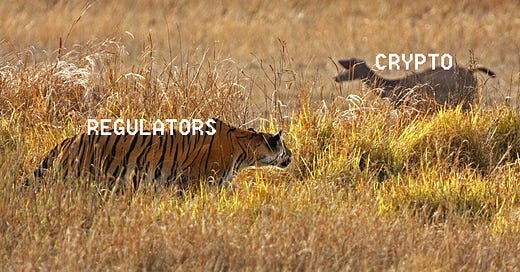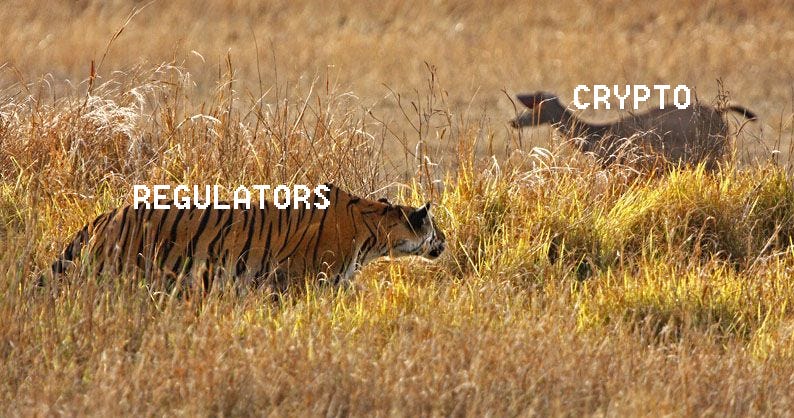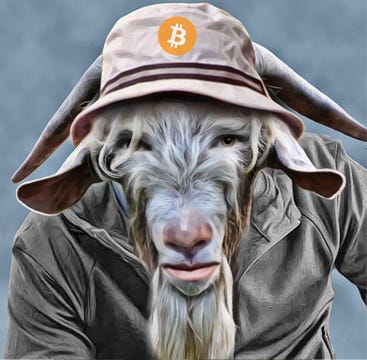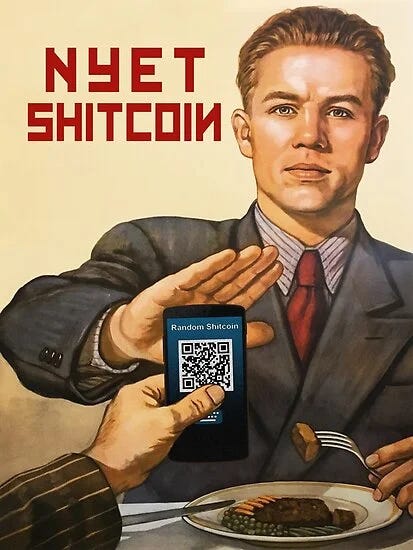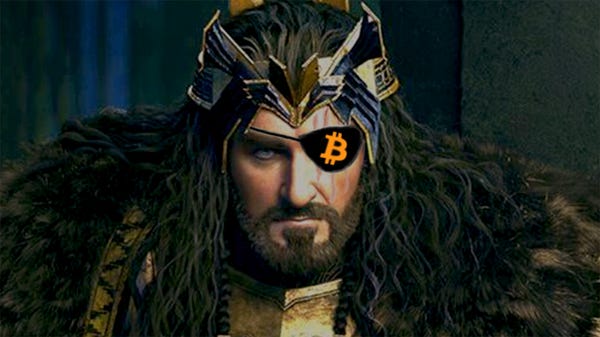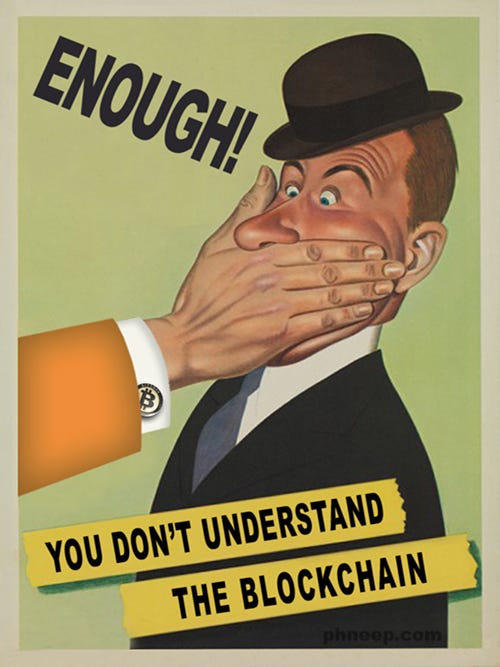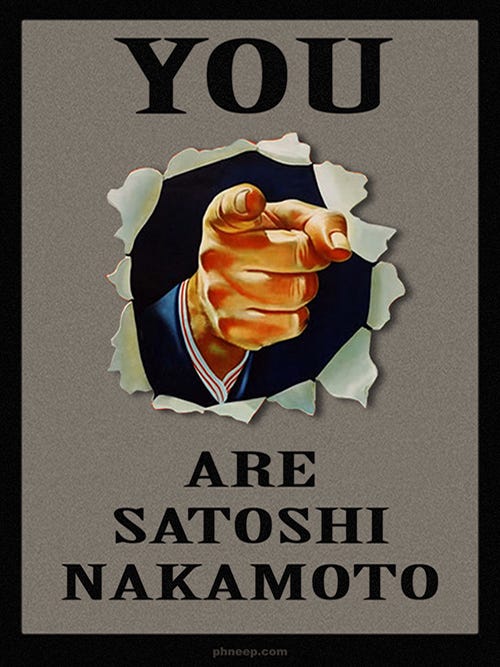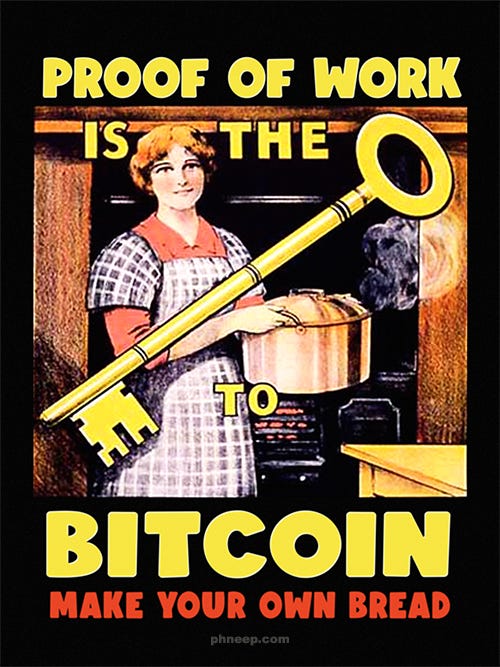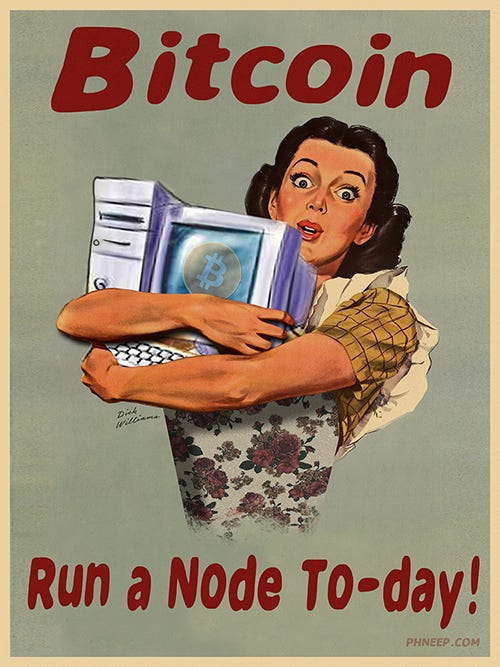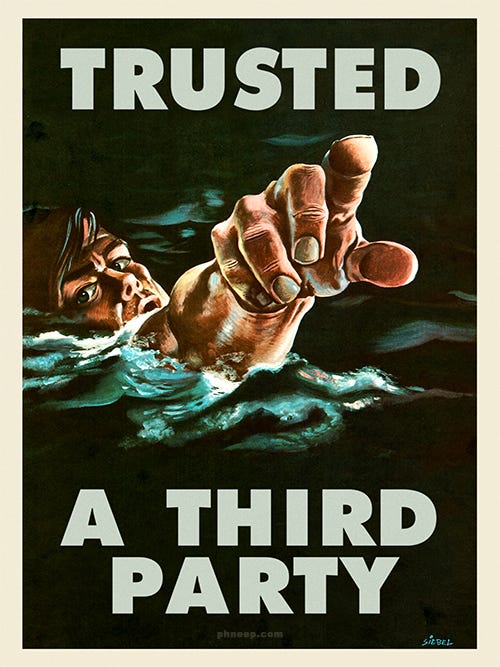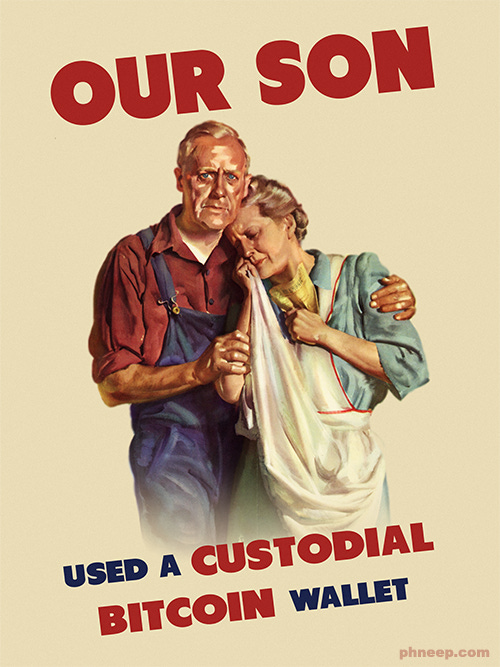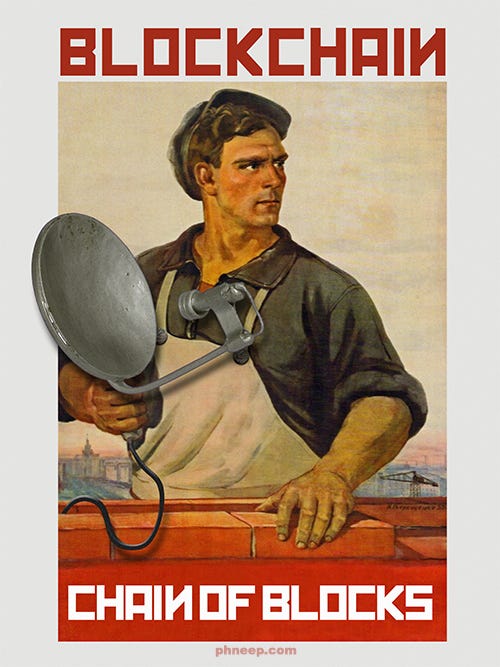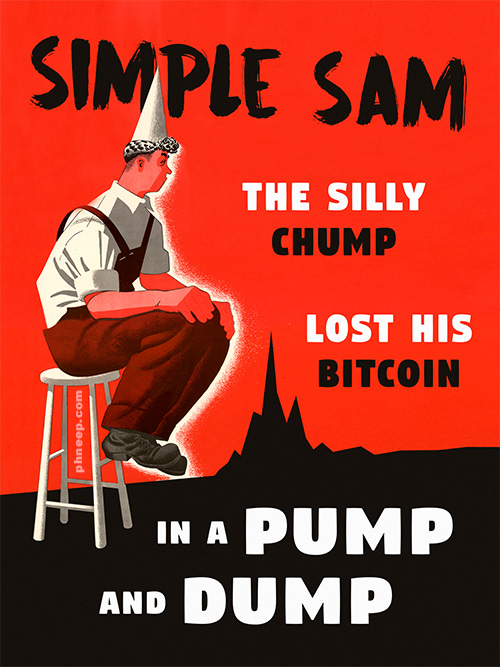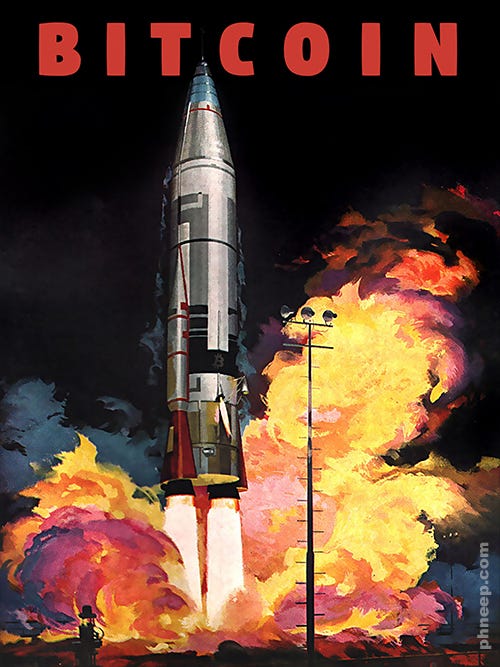Crypto Commodities VS Crypto Securities
Regulation is an issue I natural aversion to. My intuition is to resist it, to keep the state’s grubby hands off “crypto”. Sadly, I’ve seen such a proliferation of fraud in this industry...
Hello everyone!
Regulation can be a difficult topic, but it is the cloud that holds down this industry today and we need to shine light upon it to clear it.
Here's a quick table of contents for you all.
The Libertarian Argument
The Shitcoin smell test
On Bitcoin’s “Immaculate Conception”
Bitcoin and Crypto Commodities
Ethereum & Crypto Securities
Ponzi Schemes And Financial Literacy
Actual “Crypto Currencies” & Stablecoins
The Libertarian Perspective & Its Biases
As a lifelong libertarian, the topic of regulation is one I have a natural aversion to. My intuition is to resist it, and my preference for a long time has been to keep the state’s grubby hands off “crypto”. Sadly, as the years go by, I’ve seen such a proliferation of fraud and ridiculousness in this industry, that today I have to hesitate and re-evaluate.
From dumb Ponzi schemes using the Bitcoin brand to scam retail via centralized, low-tech websites. To tens of thousands of straight scams, be they Ethereum tokens, or blockchain forks whose nature intentionally or not is that of concentrating wealth in the hands of 'founders' from later 'investors'. Often with few if any products, services, or solutions to back up that value.
This article explores the topic of crypto regulation. The more relevant proposed frameworks, what I think would make sense, and what impact they might have if any at all.
As a matter of principle, I have to remind my fellow Anarcho Capitalists and libertarians that fraud is a violation of the non-aggression principle. And while the state has a monopoly on violence, its processes are the lowest risk path to any kind of justice or retribution, despite being as dysfunctional, corrupt, or inefficient as they often are.
I point this out not because libertarians do not know this, but because as an intellectual movement, we seem to have neglected the issue of fraud. While the greats have talked about fraud AFAIK, they did not have shitcoins and the internet to contend with. We do.
Years ago I warned that if crypto failed to regulate its excesses, the feds would come and do it for us. Bitcoin advocates warned endlessly about the risks of crypto Ponzinomic schemes for well over a decade, to no avail.
Well, the US government now has a very clear path to regulate crypto, given the tens of billions of dollars wasted and stolen by the likes of FTX and other CEFI. People are pissed off, they want blood. That blood lust is a red carpet for politicians and they are waltzing on in. The question is, what regulatory structure will they erect? And which should they - if any? And, will it make any difference, given that fraud is already illegal?
We shall see if the SEC and these laws have any real weight to them with FTX and 'Scam' BANKman Fraud. If the US government will prosecute SBF on what looks like very obvious fraud, despite being part of their elite. If SBF does not do hard time. Then we will (again) get confirmation that the regulatory and legal systems are totally pay-to-play.
My mentor Ugly Old Goat sure seems to think the whole government is pay-to-play and corrupt to the core, starting with the FBI and the SEC. He actually served a decade in prison for wire fraud after his gold backed financial venture went under with the help of the feds decades ago. So it may very well be the case that all this regulatory talk is doomed to fail anyway.
Nevertheless, this article explores the topic from a good faith perspective, addressing the empirical realities and attempting to establish a reasonable moral framework, which a functional government that is not entirely doomed, should be able to approach.
For the sake of brevity we are going to ignore the KYC and Surveillance layer of regulatory capture, which I wrote about earlier this month.
Bitcoin and Crypto Commodities
Ok, let’s differentiate Bitcoin from 'crapto' for a moment… I mean, crypto. This is essential from the perspective of risk management, investment analysis and regulation.
Too many noobs have bought the idea that Bitcoin is crypto and this could not be further from the truth.
Crypto is to Bitcoin like Cain is to Able. They may have been brothers, both children of God, but they are hardly the same in moral terms or in their design choices. They share a common humanity, and common cryptographic building blocks, but their intents, and moral structure are fundamentally different.
This is not to say that all crypto is evil, or that all crypto enthusiasts and entrepreneurs are walking the path of the dark side, so to speak. But rather that the structure of crypto financial assets is very unlikely to recreate Bitcoin, even if all the same design choices were made, anonymous benevolent founder included.
Even the most easy to defend altcoins, like Monero which is actively used and privacy defending - something I value highly - still hard fork too often to be considered decentralized. Though with time, if the incentives of any crypto ecosystem are well structured, decentralization is at least theoretically possible.
And just to be clear, I’m not a bitcoin Maximalist, I’m a shitcoin minimalist.
I’ve long parted ways with that straw man, invented by Vitalik Buterin to keep Bitcoiners in a symbolic straitjacket.
Bitcoin is the king of crypto, and one day may be the king of money, not because of its flag or a tribe, but because of its fundamental qualities and features, because of its nature, history, purity and its economic incentives. Bitcoin is king because it's whole structure is designed to defend the fundamental innovation - immutability.
However, while its seat at the throne of this industry may last forever, that is not actually a given. Bitcoin's qualities need to be maintained and those qualities need to be valued by the market over time, for the crown at least price wise to be maintained.
In fact, there's probably a price at which if Bitcoin hit and stayed at for too long, would kill the network. Hashing rigs would become non profitable and sold for pennies on the dollar, drastically lowering the cost of 51% attacking Bitcoin, as economically incentivized miners flee the network due to zero profitability.
But that's another topic. My point is. Bitcoin is not a given, it is a system.
Also money is not the only financial asset in the world.
To quote Max Keiser;
“capitalism requires capital”
And as such, equity is a fundamental financial tool of our advanced societies.
It might be even more accurate to say that you can't have capitalism without equity.
Because of this economic reality, with Bitcoin's defensive hyperfocus on sound money, various experimental financial applications, and attempts at bringing cryptographic innovation to equities markets improvement has been pushed out to other networks.
Few of them passing the scam sniff test of course. And most, in particular those raising funds for various projects, try to avoid coming off as outright equities, despite desperately seeking to inhabit said properties.
In other words, crypto as a fundraising vehicle for startups and companies, has pretty much always sought regulatory avoidance and arbitrage around US securities laws.
There are clear exceptions to this rule, and niches that are not attempts at creating equities, again like Monero. Anon nerds who like to buy drugs online regularly use Monero, as well as other useful applications for anonymous digital currencies.
The utility of XMR is proven when federal agencies actively attack it and even try to find people to help them break it, via bounties like two contracts for $625,000 offered by the IRS for anyone that can hack Monero to make it traceable. Monero is proof of a crypto niche that stands on its own merit, even if temporarily. Even if unable to scale or take the Bitcoin throne. Even if unable to surpass it as sound money. Monero, never the less stands in the market, despite best attempts by Bitcoin maximalists to shun it.
So what’s this sniff test?
Well, back in my day, during the great shitcoin boom - lol - we had one particular heuristic. The bigger the premine, the more likely the scam. Usually anything above 15% premine was way too much, far too sketchy. Why? The asymmetry of knowledge from founders and their dumping power.
While the public had to buy the token to introduce market forces to it, founders had a bag from the start, that they could dump on retail, while also having the best vantage point to gather information about the market and the product.
Turns out, 15% was too generous. Any percentage above zero premine means the thing is at the very least not a commodity, it cannot be. God did not keep a portion of the gold he created on earth after all, it was all there for the mining. If you get my point.
God has no bags of gold to dump on Peter Shift’s twitter followers - Unlike Peter who mainly invests in mining companies, while shilling their product -Gold- to his fellowship of gold bugs, lol.
If a crypto asset is created with no premine, and people are being educated about the project as soon as possible, then those who earn its emissions are true believers taking calculated risks and making real contributions to the network with equal opportunity among all holders and users. Without a premine, coins must be earned and they are often earned through 'proof of work' processes which require at least some technical knowledge on the part of the public which is investing in this crypto asset. The investment is in the form of electricity, talent and hardware resources. The good produced is the altcoin.
Finally, having benevolent anonymous founders might also be an essential quality of crypto commodities. This is (un)fortunately a very high bar. Anonymity is incredibly hard to maintain over a long period of time and the more successful the actions of an anon, the more scrutiny they call upon their print left on the world. More often than not leading to the discovery of the individuals and thus, the elevation of authority and responsibility of one or a few individuals over their creations.
Turns out, one of the most important things Satoshi ever did, was disappear.
These are all essential qualities of a crypto commodity, as fundamentally different than a crypto security. But they are alone, not sufficient.
Decentralization has to be reached, and there are likely more variables at play including luck, to reach the soon to be coveted 'crypto commodity' legal status.
On Bitcoin’s “Immaculate Conception”
Why is Bitcoin a 'crypto commodity'? Well, let's get into that.
Did Bitcoin have a premine? The short answer is no.
Satoshi announced Bitcoin among those most likely to understand and appreciate its nature, in the cypherpunk mailing lists on October 31st 2008. He then continued to engage the topic until launch on January 3rd, 2009. The Bitcoin Talk Forum was founded shortly after.
Satoshi stayed for two more years during which he communicated actively and answered all kinds of questions.
He is believed to have mined Bitcoin during that era at a slower pace than he actually could have, apparently with the aim of growing the mining difficulty to healthy levels. Another example of his 'benevolence' as a leader.
He could have blown up the supply, concentrating it in his own hands, but instead he slow mined it and kept the block time close below 10 minutes to raise the difficulty of the network and thus increase Bitcoin's defense capabilities.
Never the less, it is estimated that Satoshi mined one million bitcoins.
What happened to these coins? Well, they have literally never been moved. We can still see them on the Bitcoin blockchain, on the addresses they were mined to.
It is unclear what Satoshi Nakamoto’s intentions with these coins were, or if he still holds the private keys. It is possible that the coins were mined to a burn address, a public address without a private key. Though you think he would have mentioned it, to appease future concerns.
It seems Bitcoin had so little value back in those years of 2009 - 2010, that no one actually asked Satoshi what he intended to do with those coins. Nobody cared, and so as far as I know, the topic was never really discussed - publicly at least.
(I’m starting to look into this question however, I’ll let you know if I find any expressions of Satoshi’s intent for them. And no CSW is definitely not Satoshi.)
Even Michael Goldstein, former president of the Nakamoto Institute a website that archives and studies Satoshi’s writings, cannot recall the the topic coming up in those days.
So anyway, even if Satoshi came back and took profits on those 1 million BTC, they were still slow mined after launch and after a strong, good faith effort to invite others to participate.
This means that Bitcoin had no primine. No coins were minted before the network was public after all. Those who had the best chance to understand the project were told about it months in advance. Satoshi's coins were mined slowly and fairly, in accordance with the spirit of the protocol. As people understood Bitcoin, they too started to mine, until Satoshi was no longer relevant.
He then parted in 2010, and has never moved those coins.
For all we know Satoshi is dead, or may have even lost his keys, given few could have imagined how valuable Bitcoin would get a decade later. I'm frankly amazed anyone in the world has the integrity and resolve to not cash out and become a multi-billionaire. So he is either a Saint, or he is dead.
Finally, Bitcoin has been practicing backwards compatible upgrades throughout most of its history. This means that all upgrades to Bitcoin are opt-in and do not change the nature of the Bitcoin, as used by those who refuse to upgrade. Segwit is opt-in, Lightning is opt-in, Taproot is opt-in. Legacy Bitcoin addresses still work, just fine.
The only hard forks that have occurred in bitcoin have been around extreme security concerns, such as a couple inflation bugs that would have broken the Bitcoin social contract as outlined in the white paper, and further Bitcoin Talk Forum conversations. And those happened years ago. Nothing is perfect.
The ability of regularly hard fork a coin, and change its nature is a sign of centralization, after all, if not outright proof of it. Backward compatibility becomes, I believe another necessary feature of a crypto commodity.
In short, these are some of the qualities that make Bitcoin different from other crypto assets and establish the category.
Fair distribution with no premine or founder share
Immaculate conception, created for the sake of innovation, not profit expectations as there was no precedent of massive gainz in 'crypto' before Bitcoin.
Decentralization achieved quickly, around 3 years in, after Satoshi left
Anonymous founder, who’s name and influence is not believed, relevant or even welcome by later generations
Backwards compatibility and opt-in only upgrades
Sufficient network stability that emergency hard forks are rare and ideally never needed
Ethereum and Crypto Securities
In contrast, we can look at Ethereum.
“The mother ass hole from which all shitcoins spring” - Seifadean.
Ethereum had a 70% premine, with founders issuing the vast majority of the coins on the market before anyone could mine them. Many of these were sold to insiders and other backers, with rumors suggesting even JP Morgan players were in on that premine. Everything else was mined much later, over a year after the ICO fund raise, when the network finally went live.
Ever since then, the network has had multiple hard forks, some far more controversial than others. Many of them changing the supply emissions for marketing purposes.
They rolled back the blockchain to undue a massive hack in the early days by the infamous DAO. And just recently they even removed the Proof of Work layer of Ethereum and replaced it with a Proof of Stake scheme that is going hilariously poorly, as OFAC compliance staking pools have dominated the scheme. Leading to long block times for transactions that use the privacy preserving tornado cash contract. And giving non competitive oligarchical power to the founders, who still hold a lion’s share of ETH, and can thus command the consensus rules of the network that are no longer guarded by proof of work.
While its a testament to how resilient crypto economic systems are to censorship, that even a coin that seems designed to be captured retains some censorship resistance, as demonstrated by the censored Tornado Cash ETH mixer continuing to process transactions albeit with multiple minutes of wait time before they are mined.
Ethereum never the less carries very different risk for users and investors compared to something like Bitcoin. It has a fundamentally different structure and ethos, even if they are made of the same building blocks. To recap:
ETH founder' share was created before coins could be mined, giving them asymmetric power over the price and the rules of the coin
Hard forks every few months that change the social contract and nature of the coin
Public founder with massive influence over the network and price
Hard fork into Proof Of Stake consensus protocol after the coin was founded on a 70% premine ICO.
A failure to decentralize as demonstrated by active consensus changing hard forks
This last point is important. Decentralization should breed resistance to change. As various interests invest in the technology they have adopted, changes to that technology should become increasingly unpopular. It is evidence of Etheruem’s failure to decentralize that they can change the proof of work layer, or other parameters like the emission rate even half a decade after its genesis.
But this is the nature of most crypto coins. Founders can dump on retail at any point and can change the nature of the asset nearly at will. If those are the qualities of the coin you like, then sorry. That’s not gold, that’s Apple stock, at best. It is a security with counter party risk and likely very little transparency, not a new element that has been discovered and can be externally verified by anyone.
Crypto is equity, not money. And equity is ok, essential to capitalism, really. But risks should be properly disclosed and understood by investors. Rather than just stand on fluffy marketing, memetic propaganda, and shiny websites.
And this is what regulators seem to be converging towards.
It isn’t some globalist attempt to capture the DeFi industry, even though that is certainly happening. No, it may also be an attempt to reign in the asymmetric risk and power created by crypto Ponzi coins, most of which are far worse than Ethereum, and provide even less real value to consumers. Ponzis actually cause net harm on local economies as financially illiterate retail ''investors' gets swindled by sociopathic nerds.
How can that be a good thing?
At least Ethereum has network effects and works as a settlement layer, with a live ecosystem on top, even if it is mostly an ecosystem of Ponzicoins.
Those who wish to create true decentralization, need to think of their creations as commodities. Those networks need to mimic Bitcoin as much as possible in their qualities - in my opinion - maintaining backwards compatibility, making them Proof of Work rather than Proof of Stake, and doing zero premines. They also need to be different enough from Bitcoin in their value propositions to consumers that they are relevant and can compete for a niche.
Finally if the founders can stay anonymous as Satoshi did, even better, though the fact we still don’t know who he is, remains a miracle of modernity that even Edward Snowden marvels at. This is impressively difficult to do, and a reason Bitcoin is so unique.
As an example, the fact that Vitalik is public as the founder of Ethereum, provides a very clear target for all kinds of coercion and attacks, many of which are likely to remain undisclosed, as I explored on my article about Ethereum and Proof Of Stake.
Everything with a premine and active hardforks, that has failed to be decentralized - however that is measured - could become regulated as an equity, requiring registration with the SEC. While crypto commodities would ideally have to pass some test by CFTC to be legally categorized as such. This is particularly important because of tax requirements.
So we are left with two categories, crypto commodities and crypto securities. We also have stablecoins and NFTs but we’ll get into those later.
Let’s talk about accredited investor laws and Ponzi schemes a bit though.
Ponzi Schemes And Financial Literacy
One of the best arguments I find myself wrestling with, is the existence and persistence of Ponzi schemes in free financial markets. Not the fact that they are created and run all the time, but that so many people keep falling for them.
Like a bad weed or a plague on the fertile soil of society’s future, these Ponzi schemes fool the financially illiterate and co-opt their greed, turning decent people into sales agents of parasitical financial schemes.
Ponzi schemes have no products, service or infrastructure to show for it, though like a virus, they evolve and often mask their nature well. Sometimes using the schemes to subsidize underlying businesses that eventually fail as they cannot otherwise stand on their own merit.
“If a financial asset produces no products, offers no services, solves no problems or builds no useful infrastructure, then it is a Ponzi scheme.” - Juan Galt
Even when backed by Bitcoin mining, ponzi schemes fail, over and over again. As in the case of Bitclub Network, a near Billion Dollar bitcoin branded Ponzi scheme that eventually collapsed, albeit with some help from the feds. I knew many ‘ancaps’ who threw real money at this and regretted it. If self proclaimed Anarcho Capitalists fall for Ponzi schemes, what hope do the economically illiterate have?
You see my concern.
Most of the normal people I know do not study finance - most people today - and they can’t seem to tell the difference between a Ponzi scheme and an equity, or a legitimate company with product market fit.
This is a fundamental issue. How can anyone make any investments at all, if they can’t tell the difference between Apple and Bitconnect?
How many people around you can? It is a failure of the modern education system, no doubt, but that doesn’t really solve the problem.
New Ponzi schemes arise in Latin America every other week. I can’t count the amount of Ponzi schemes using the Bitcoin brand I’ve seen, and they continue to come, with no end on sight. Exploiting the public's ignorance about self custody and tarnishing the Bitcoin brand, through centralized websites and private ledgers.
The fact that they continue, proves that they are profitable. Someone is losing money to them, someone is getting rich off them.
Most ETH tokens, altcoins and DeFi assets are fundamentally Ponzi schemes. At least equities in theory have a product underneath that is finding product market fit. If they have an equity trading on the public markets, they are also required to make public disclosures of risk and there are some consequences for corruption, insider trading and other forms of fraud.
On the private side of equity investing we have accredited investor laws - in the USA anyway - which back when I got into Bitcoin were 200k USD a year minimum that had to be proven to be able to play.
Today, new investment paths are opening up as demonstrated by Lightning Ventures, where small investors can contribute as little as 1000 USD to various companies coming together as a syndicate of sorts.
While I’m no expert in this area of investment, it is blatantly obvious to me that 200k a year to make investments at all, is a non starter and prices out 99% of the world from private markets.
So on the upper end, further reform of these standards is a very good thing.
On the lower end however, perhaps education is the only path to counter the Ponzi schemes and other frauds.
If the SEC and FBI are too incompetent and corrupt to stop the proliferation of these financial viruses. This pandemic of Ponzi schemes, then only hard earned lessons might do that job.
Ponzi schemes and fraud is already illegal, after all. The laws simply are not or cannot be effectively enforced. This begs the question as to whether we even need regulation at all. Rather than just regulatory clarity.
From this perspective, the only way scam coins will die is after they have burned through the population of financial illiterate, so to speak.
And multiple generations of them, to boot.
In the absence of a real watch dog with political power, all shitcoins that can be made, will be made, pumped, dumped, exit scammed and rug pulled. Until our children’s children look back at the history of crypto with the same horror Cubans look at Castro and Eastern Europeans look at communism. A horror show to stay the fuck away from.
Actual “Crypto Currencies” and Stablecoins
Ah stablecoins and other marks of the beast. :)
As long as there are fiat currencies, and as long as something like Bitcoin isn’t considered a currency by local states, then currencies and stablecoins will be fiat in nature. Be it USDT, USDC or even BUSD, the only real “crypto currencies” are stablecoins and this category is relevant because taxation and legacy accounting continues to exist.
These stablecoins will become regulated as they already are, with KYC requirements to whatever degree possible, as well as active on-chain and IP tracking. They will carry zero censorship resistance, or very little, and are highly likely to become the de facto CBDCs that the elite lust for, and the public rightfully fear.
Economic policy will increasingly influence stablecoins and they will become increasingly integrated with the states that issue the underlying fiat. If they don’t play ball they can and likely will be attacked out of existence.
Algorithmic stablecoins are and should be dead now. They have proven fundamentally unstable with a long list of implosions with increasing magnitudes of loss. Even DAI which was for a long time touted as a great example of a decentralized stablecoin, it is now owned by Coinbase and mostly backed by USDC.
These never the less deliver new qualities to currency allowing them to reach much further than the banking system, with much lower KYC requirements, as they ride on cryptographic authentication systems instead of biometric authentication. Allowing the unbanked, yet digitized people throughout the world to access better money than their local fiat and thus benefit from the jurisdiction of better governments than their own, regardless of who they are or where they live - sanctions aside.
They also settle much faster than legacy finance which provides massive efficiencies to markets globally.
Alright, I think that’s all. NFTs are a beast of their own and do carry a risk of being categorized as equities as well. But that's a topic for another time, as they follow the same backwards compatibility rules as anything else in crypto. I'll leave it at that for now.
Cheers!
Juan Galt.
(Special thanks to Phneep, for all the Bitcoin memes!
Juan Galt.


